With Bobby, Emilio Estevez, writer and director (as well as one of a huge ensemble of actors), sets himself a large and honorable task. It is important to appreciate this in spite of his movie's evident shortcomings.
Intentions do count for something, and Estevez's seem to me entirely admirable. He tries, by means of the familiar technique of weaving together story lines connected only by coincidences of time and place, to produce a feeling of collective life. Beyond that, he tries to link the intimate stories of nearly two dozen characters to a large and consequential public event - the assassination of Robert F. Kennedy - and to capture the heady combination of anxiety, anger, hope and idealism that supposedly characterized the US in 1968.
All of the action in Bobby takes place at the Ambassador Hotel in Los Angeles on June 4, 1968, the day Kennedy, a late entry into the presidential race, won California's Democratic primary. After midnight, as Kennedy made his way from a ballroom through the hotel's kitchen, he was fatally shot, a calamity that casts its shadow backward over the more mundane doings of the day. In every scene of Estevez's film, portent hangs heavy in the air.
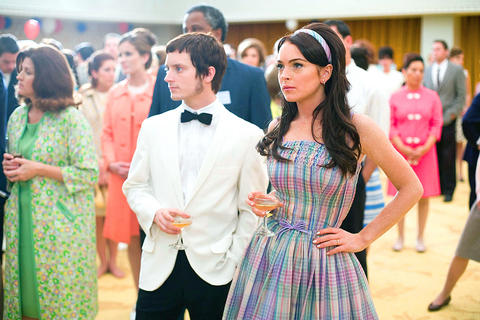
PHOTO: COURTESY OF WARNER BROTHERS
The candidate himself is a tangential figure, present mainly through archival news clips and audio recordings, in which he talks, with a quiet eloquence that sounds almost outlandish to present-day ears, about the problems of poverty, prejudice, pollution and war. His assassin also barely figures in the story. Instead Bobby uses both Kennedy's candidacy and his murder as a kind of prism, through which the aspirations and confusions of a cross section of Americans might be filtered.
Not all their concerns are political. Yes, the Mexican-American kitchen workers (Freddy Rodriguez and Jacob Vargas) argue about social justice with the wise black cook (Laurence Fishburne) and trade scowls with their bigoted boss (Christian Slater). And a young woman (Lindsay Lohan) prepares to marry a young man (Elijah Wood) to keep him out of Vietnam, even though she doesn't know him very well. But at least as much attention is paid to the vague discontent experienced by a middle-aged couple (Martin Sheen and Helen Hunt), to the mutterings of the hotel's retired doorman (Anthony Hopkins), and to the adventures of a pair of young campaign workers (Brian Geraghty and Shia LaBeouf), who skip out on their canvassing duties to drop acid for the first time.
There's much more. There's Demi Moore, playing a boozy chantoozy with the kind of manic gusto you expect from drag performers. (She behaves like a cast member in the Wigstock road-show production of A Woman Under the Influence: The Musical.) Estevez self-effacingly takes the role of her husband, who minds the lap dog and wears an ascot, sure signs of emasculation. Meanwhile the hotel manager (William Macy), married to one of the hairdressers (Sharon Stone), carries on an affair with a young switchboard operator (Heather Graham). A black Kennedy staff member (Nick Cannon) embodies the aspirations of his race.
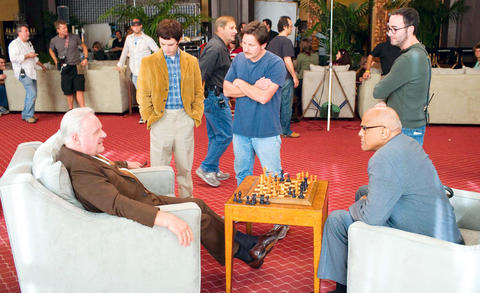
And so on. As if to make sure that we understand this movie's pedigree, Estevez throws in a clumsy reference to Grand Hotel. He also nods vigorously in the direction of Robert Altman, stitching his disparate narrative threads together with floating cameras, long, twisty tracking shots and snappy cuts. These techniques give Bobby a degree of fluidity and momentum, but the multiple story lines coalesce in a manner more reminiscent of The Towering Inferno - or an episode of Fantasy Island - than Nashville. Each story rises toward an epiphany that is quickly overwhelmed by the gunshots in the kitchen.
The actors seem more like very special guest stars than like real, vintage 1968 Americans, and their period-appropriate get-ups - the narrow lapels and skinny ties, the sheath dresses and piled-up hairdos - are more distracting than convincing. Some of the stories feel too obviously melodramatic, while others are vague to the point of inscrutability. In the Vietnam- and drug-related plots, the point is hammered home too hard, while other narratives wind toward no discernible point at all.
Nonetheless the ambition behind Bobby is large and serious. Along with many other Americans who grew up in the wake of the 1960s - for whom figures like the Reverend Martin Luther King Jr. and Kennedy were always more myth than flesh and blood - Estevez, who was six years old when Kennedy was shot, seems preoccupied with understanding what it was like to live through some of that decade's galvanizing events.
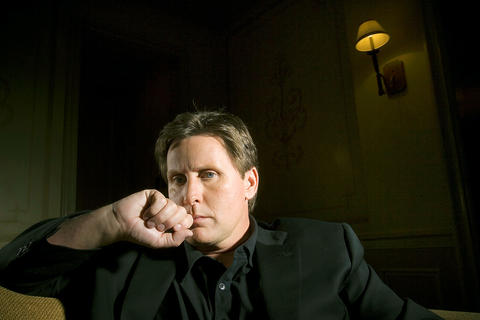
The pulse of history is most audible not in the fictional portions of the movie, but in the moments, especially at the end, when the documentary record takes over. The sound of Kennedy's voice, even as it takes you out of the movie, throws you into a past that seems both terribly remote and uncannily alive. When you hear his patient, meditative speeches, from which every note of demagoguery or pandering has been purged, you glimpse the film Estevez set out to make - the one you may wish you were watching.

Water management is one of the most powerful forces shaping modern Taiwan’s landscapes and politics. Many of Taiwan’s township and county boundaries are defined by watersheds. The current course of the mighty Jhuoshuei River (濁水溪) was largely established by Japanese embankment building during the 1918-1923 period. Taoyuan is dotted with ponds constructed by settlers from China during the Qing period. Countless local civic actions have been driven by opposition to water projects. Last week something like 2,600mm of rain fell on southern Taiwan in seven days, peaking at over 2,800mm in Duona (多納) in Kaohsiung’s Maolin District (茂林), according to
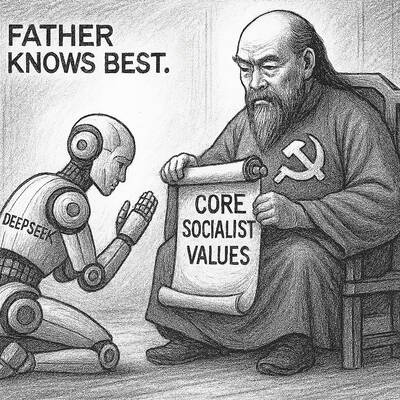
It’s Aug. 8, Father’s Day in Taiwan. I asked a Chinese chatbot a simple question: “How is Father’s Day celebrated in Taiwan and China?” The answer was as ideological as it was unexpected. The AI said Taiwan is “a region” (地區) and “a province of China” (中國的省份). It then adopted the collective pronoun “we” to praise the holiday in the voice of the “Chinese government,” saying Father’s Day aligns with “core socialist values” of the “Chinese nation.” The chatbot was DeepSeek, the fastest growing app ever to reach 100 million users (in seven days!) and one of the world’s most advanced and
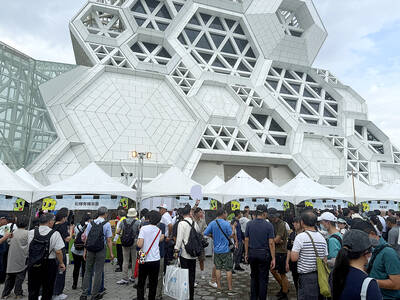
The latest edition of the Japan-Taiwan Fruit Festival took place in Kaohsiung on July 26 and 27. During the weekend, the dockside in front of the iconic Music Center was full of food stalls, and a stage welcomed performers. After the French-themed festival earlier in the summer, this is another example of Kaohsiung’s efforts to make the city more international. The event was originally initiated by the Japan-Taiwan Exchange Association in 2022. The goal was “to commemorate [the association’s] 50th anniversary and further strengthen the longstanding friendship between Japan and Taiwan,” says Kaohsiung Director-General of International Affairs Chang Yen-ching (張硯卿). “The first two editions
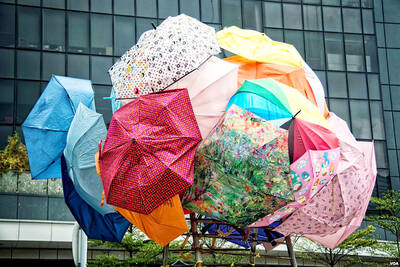
It was Christmas Eve 2024 and 19-year-old Chloe Cheung was lying in bed at home in Leeds when she found out the Chinese authorities had put a bounty on her head. As she scrolled through Instagram looking at festive songs, a stream of messages from old school friends started coming into her phone. Look at the news, they told her. Media outlets across east Asia were reporting that Cheung, who had just finished her A-levels, had been declared a threat to national security by officials in Hong Kong. There was an offer of HK$1m (NT$3.81 million) to anyone who could assist